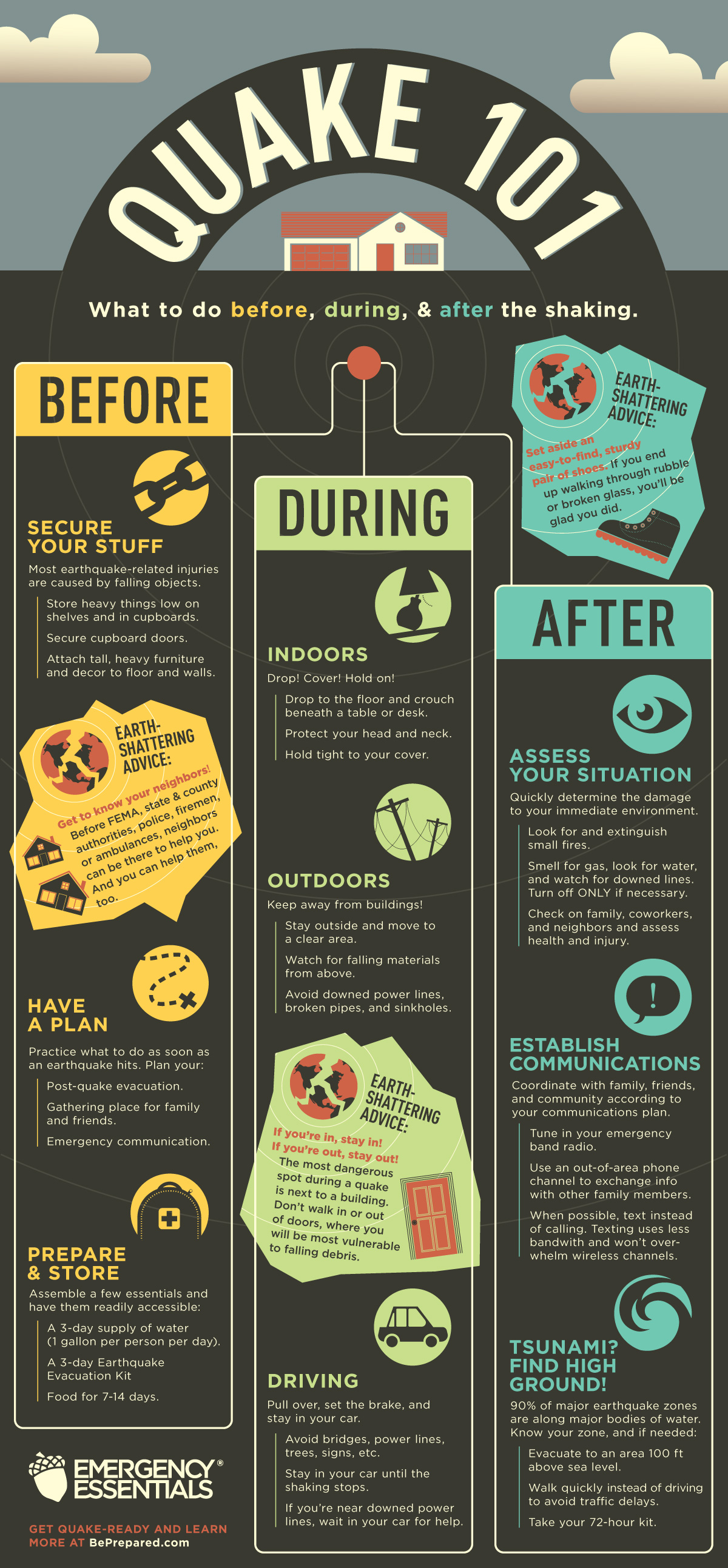Developments in data science are now paving the way to what in the past is deemed impossible — the prediction of earthquakes with the use of machine learning.
If things go well, such a technology would help us avoid the destruction caused by this natural disaster.
Even if things do go well, however, we are still at risk when an earthquake strikes. Knowledge on how to act prior, during, and after an earthquake is something everyone must be equipped with.
Here are things you should keep in mind.

From our partners:
Before an Earthquake
Japan, known for being highly susceptible to earthquakes has shown that preparedness is an effective tool to reduce the damage that an earthquake could potentially cause. Before an earthquake even occurs, you can make sure you are ready,
- Ready a survival kit. Make sure you have everything you might need after the earthquake. The kit should last you a few days up to a week. Red Cross has a guide to help you get started.
- At the minimum, your survival kit must have the following items:
-
- Water: one gallon per person, per day (3-day supply for evacuation, 2-week supply for home)
- Food: non-perishable, easy-to-prepare items (3-day supply for evacuation, 2-week supply for home).
- Baby supplies (bottles, formula, baby food, diapers)
- Pet supplies (collar, leash, ID, food, carrier, bowl)
- Flashlights with adequate batteries
- Battery-powered or hand-crank radio
- Extra batteries and fully-charged powerbanks
- First aid kit
- Medications (7-day supply) and medical items
- Multi-purpose tool (Swiss knife, can opener, scissors, etc.)
- Sanitation and personal hygiene items
- Copies of personal documents (medication list and pertinent medical information, proof of address, deed/lease to home, passports, birth certificates, insurance policies)
- Cell phone with chargers (Similar item available in the Red Cross Store)
- Family and emergency contact information
- Extra cash
- Emergency blanket
- Map(s) of the area
- Extra clothing (jackets, hats, sturdy footwear)
- Extra set of car keys and house keys
- Whistle
- Survey your home. Make sure that nothing would pose a risk should an earthquake occur. Do not place heavy objects on top of cabinets as it poses risks of falling. Secure heavy pieces of furniture and equipment and be aware of the exit routes.
- Coordinate. Plan out how you are going to communicate with your loved ones. Here is a guide on things you should be talking about.
During an Earthquake
When an earthquake hits, knowing how to respond properly is highly important. Depending on what circumstance you are in, there is an appropriate response,
- Drop, Cover, and Hold. When indoors, do not panic or attempt to run around or outside. Most accidents come from getting hit by falling objects and debris while attempting to move during an earthquake.
- Drop, cover, and hold until the shaking stops. Look for a sturdy table or desk and take cover under.
- If you are outdoors, get out in the open away from buildings, power lines or other structures that might fall.
- If driving, slowly and carefully stop the car. Do not stop near bridges, buildings, posts, or trees. Stay inside your car until the shaking stops.
- The United States Geological Survey provides more detailed information here on how to respond depending on your location.
After an Earthquake
Having survived the earthquake, the actions you take in the aftermath is just as important. Keep the following in mind:
- Exercise caution. After the earthquake, hazards like leaking gas pipes, fire, damaged power lines, and sharp debris may be present. Be careful of your surroundings as you move and report any fires or damages near your area.
- Seek help. If anyone is injured, apply first aid if possible. Ask for help if needed.
- If you are living near coastal areas, monitor the news for possible tsunami warnings and evacuate to higher ground immediately.
- Stay put. Relocate to the designated evacuation areas. Stay informed of the situation through reliable outlets like the news.
In the face of a powerful, unpredictable opponent, even Big Data could only help us so much. While these steps are in no way an absolute defence to an earthquake, you are no longer powerless.















